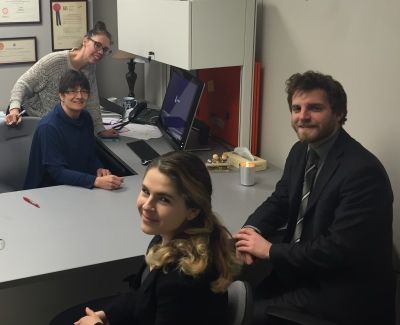
Bail reform is a hot topic in Canada right now: pre-trial detention is blamed for overcrowding in provincial jails. The subject has recently attracted the attention of both the Ontario Attorney General and the federal government. To tackle these problems, Queen’s Legal Aid (QLA) began offering the first and only student bail program in Canada last June to reduce overcrowding at Quinte Detention Centre.
The program sees Queen’s Law students helping women who have been accused of crimes and who are held in pre-trial detention get a release. To date, its student caseworkers have already assisted on 31 bail matters.
“Prior to our program starting, Quinte Detention Centre had 29 women in custody,” says QLA Review Counsel Jodie-Lee Primeau. She is the founder of the program and its current supervisor until January 2017. “The Detention Centre only has room for 19 so this meant that women were regularly being triple-bunked (two women in bunk-beds and one beneath a metal table on a thin mattress on the floor) or even held in segregation simply for want of space,” she explains. “Even more importantly, all 29 of those women had not yet had a trial or plea; in other words, they were legally innocent. Within three months of our program only nine were being held.”
Working on bail matters is a unique and valuable opportunity for Queen’s Law students. They receive specialized training from QLA review counsel and are granted access into Quinte Detention Centre through the Elizabeth Fry Society. The end product is a lengthy memorandum detailing a bail plan, avenues of support and legal issues that may hinder the client’s access to bail.
The process is one that requires a great deal of communication with clients, local lawyers and community organizations. “The students meet clients in the cell block and interview them about their current social supports and areas where they may have issues getting bail; for example, problems with mental health, finances, addiction and housing,” Primeau describes. “They help explain the bail process to clients and begin to brainstorm strategies. Many clients may not even be aware of the possibility of or the procedure for being released before trial. It is apparent that people we have not helped individually have learned about their bail rights through our representation of their cellmates.”
The caseworkers then liaise with the client’s private bar lawyer, the Elizabeth Fry Society, the John Howard Society and other community organizations. “Law schools across Canada have fewer and fewer criminal law practice opportunities,” says Primeau. “Getting criminal law articles is extremely difficult and students are regularly hired based on practice-readiness. In this program, students work in partnership with local private lawyers, creating networking opportunities and mentorship relationships.”
The program’s clients are provided access to justice in a system that Primeau describes as unfair to marginalized people. “Persons charged with criminal offences can only meet with duty counsel in court on the date of their hearing,” she says. “This means that virtually no time is allotted for them to create a bail plan that will give them a chance to be released pending their trial.”
“Even for the clients who do have a legal aid lawyer, the certificate does not come close to affording the lawyer enough paid time to work on a bail plan,” she continues. “When clients cannot work with their legal counsel in a meaningful way on a release plan, it means they are much less likely to convince a court that they will not pose a risk to the public while on bail; and so, they will likely be detained until their trial.”
The most rewarding part of Primeau’s work in the bail program has been seeing students take ownership of it so as to direct and continue it under the supervision of Susan Charlesworth after she leaves in January. “Together, we have put in place systems and students to ensure the ongoing work of the program even on very limited funding. Watching students direct themselves and the program to ensure social justice for those in dire need of assistance gives me a great deal of faith that we are molding motivated, socially-conscious and innovative lawyers in the clinical education system.”
“Queen’s Legal Aid is delighted to have this valuable service added to the other legal assistance that we provide to the community,” adds Susan Charlesworth, Law’81, QLA Senior Review Counsel. “The bail program anticipated the Ontario government’s new plan to make the judicial system faster and fairer, and it has been extremely well received by the many women incarcerated while awaiting trial. The local lawyers representing those women also appreciate the student’s assistance in arranging sureties and services in the community to help with bail planning.”
— Anthony Pugh